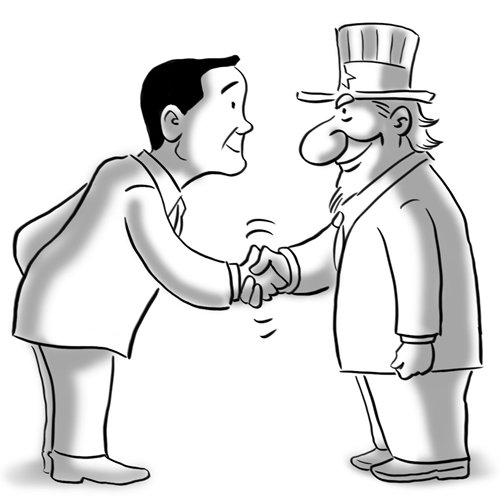Starting Sunday, Singapore Prime Minister Lee Hsien Loong embarked on his five-day trip to the US, the first such trip since President Donald Trump entered the White House. Despite the close relationship between Singapore and the US, mutual visits between the two leaderships are not that frequent. Amid the current scenario of US domestic and Asia-Pacific politics, Singapore holds high expectations for this visit.

Illustration: Liu Rui/GT
Since the US and Singapore established diplomatic ties in 1966, bilateral relations have prospered in a broad spectrum of fields including trade, investment, security and defense, These fields go beyond normal relations between the US and its other allies. This bilateral relationship is even more noticeable due to its impact on regional affairs. It is not exaggerating to describe the US as the world's most influential big power and Singapore the world's most influential small power. Late Singapore founding father Lee Kuan Yew repeatedly noted in his book One Man's View of the World, "America's presence has been an important stabilizing factor for the region. Its continued presence will help maintain that stability and security."
This notion came about from Singapore's vulnerability as a small country. It means it has to rely on big powers in its foreign relations and adopt a balancing approach among the big powers. On the other hand, when Lee Kuan Yew attended the UN Decolonization Committee in New York in 1962, what he saw was a postwar, confident country taking over world power.
Based on these two notions, Singapore actively pushed forward multilateral platforms such as the Association of Southeast Asian Nations and the Forum of Small States and took part in institutions like the Asia-Pacific Economic Cooperation, the Group of 20 and the lapsed Trans-Pacific Partnership (TPP). Meanwhile, Singapore lobbied the US to maintain its strategic presence in the Asia-Pacific, especially Southeast Asia, to balance against other regional powers and ensure its own interests.
After the Cold War, US governments acknowledged Singapore's will and maintained a US presence in the region. The administration of Barack Obama enhanced this policy through its rebalancing strategy.
But since Trump took power, US domestic and foreign political landscapes have changed. His decision to quit the TPP has unsettled participants including Singapore. Prior to his US visit, Lee Hsien Loong revealed disappointment over Trump's move when interviewed by US media.
Given the conservative attitude of the Trump government toward global trade and regional affairs, Singapore, highly dependent on the international market, has been deeply concerned. It hopes that Trade and Industry Minister S Iswaran, who is accompanying Lee during this trip, will strike deals with his US counterpart.
Security and defense cooperation is another consideration of bilateral cooperation. Tommy Koh, Ambassador-At-Large at Singapore's Ministry of Foreign Affairs, recently wrote that judging by GDP per capita, power of trade and money, power of communications, power of good governance and power of ideas, Singapore is not a small country. He also contended that in Singapore's relations with other countries, it should "be respectful but not submissive."
However, the vulnerability of a small country cannot be dispelled by the above-mentioned indicators, especially the security vulnerability. Maintaining traditional cooperation in security and defense is another priority of Lee's trip.
Due to Singapore's balancing act and the strategic positioning of China and the US in the Asia-Pacific, no matter whether it is US-Singapore relations or China-Singapore relations, Singapore cannot escape the general picture of China-US relations. Lee's visit this time comes after his China visit in September and before Trump's Asia tour in November. Concerning Singapore's role between China and the US, international opinion will inevitably link the three countries and speculate about their policies.
As for regional affairs concerning China, Singapore will stress its neutral stance. When it comes to topics related to both China and the US, Singapore hopes to befriend both. China is Singapore's biggest trading partner while the US is its security shield. In other words, Singapore cannot afford to displease both. To maximize its interests in its relations with both Beijing and Washington is obviously Singapore's best approach.
The author is a research fellow of the Research Institute for Singapore Studies at Shandong University of Political Science & Law and The Charhar Institute.
Source: Lee Hsien Loong visits US, maintains delicate balancing act with China Global Times, October 23, 2017